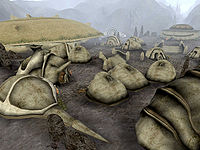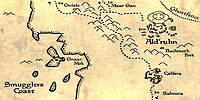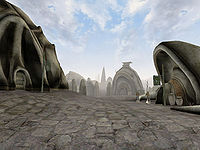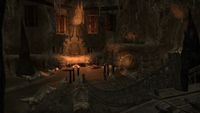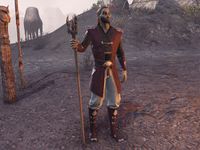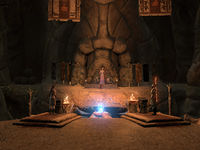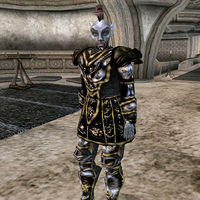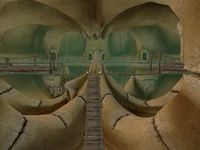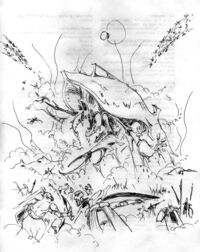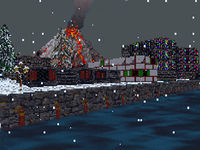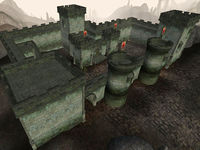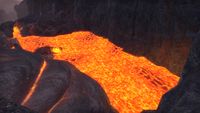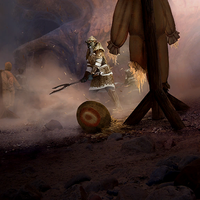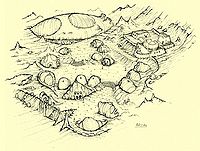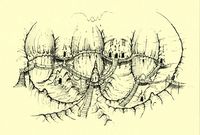Lore:Ald'ruhn
| Ald'ruhn | |
|---|---|
| Type | Settlement |
| Continent | Tamriel |
| Province | Morrowind |
| Region | Vvardenfell (Ashlands) |
| Appears in | Arena, Morrowind, ESO |
Ald'ruhn (Dark Elvish for "Old Home" and also spelled Ald-ruhn)[1] was one of the four cities on the district of Vvardenfell. In modern history, Ald'ruhn served as the district seat of power for the Great House Redoran,[2] but before it was occupied by the House Dunmer, it was neutral meeting ground for the four tribes of the Vvardenfell Ashlanders. The settlement was built around the carcass of Skar, an ancient Emperor Crab that was slain by the united tribes and a long-forgotten hero of legend.[3][4] The Third Empire maintained the Buckmoth Legion Fort on the south end of the city,[2] and occasionally Imperialized the city's name as Old Run.[5][6]
Contents
Layout & Geography
Ald'ruhn is situated on the western-side of the Ashlands, between the main road that runs through the West Gash and the Ghostfence that surrounds the caldera of Red Mountain. The land is inhospitable for the common-folk, its riddled with steep hillscapes, dead wood, and jagged rocks, and not much can be found beyond the city limits, other than the banks of the Foyada Drura to the west. Even so, the community of Ald'ruhn had always lived through the harsh environment, from the ash storms to the sparse grazing. The main road that runs through the West Gash forks toward Ald'ruhn and another thoroughfare that scales north through the Ashlands until it comes toward Bal Isra and Maar Gan.[7] The land has its fair share of ancestor worship, from the ancestral tombs of Clans Hleran[8] and Fadathram,[9] to the cairns of the First Ashkhans,[10] and even the mythos of the city's most iconic landmark, the carcass of Skar.[3]
The settlement was built just south of Skar's carcass, and its maw was used as the entrance. The front of the carcass was typical the settlement's central square and the carapace itself was used as a place of great importance. Back when the town was an Ashlander meeting ground, there was a large campfire and circle in front of Skar and several yurts assembled around the circle. As the hill descended downward to the west, yurts became less prevalent and the local wayshrine sat solemnly on the road.[11] When the proper Redoran city was founded, Ald'ruhn became walled-off and it had large, perched watchtowers. Much like other Redoran townships, the city was built in the typical Redoran village style, with organic curves and undecorated exteriors reminiscent of the environment. There were three principal districts in Ald'ruhn. There was Ald'ruhn Town, the outer-half of the city. The southern-half of the area consisted of business and guildhalls, as well as the city's entrance and Silt Strider port. The other side of the area was the local temple. The northern-half of Ald'ruhn Town was various homes and local businesses. The second district was the Ald'ruhn-Under-Skar, which was built inside the Emperor Crab's shell. The Manor District was connected together with wooden bridges over the ground floor and wooden boardwalks that went around the wall of the carapace. Manors dedicated to each member of the Redoran Council and the Council Hall were located on this upper level, while more upscale businesses were found on the bottom.[2]
Notable Locales
|
|
|
History
The Battle of Skar and the Folly of Clan Hleran
Before there was Ald'ruhn, there was the Emperor Crab known as Skar. Back when the Chimer were nomadic-folk[4] and lived in tribes that later became the Great Houses,[13] Skar was an unstoppable force of nature that wreaked havoc across the land. The First Ashkhans of the Ahemmusa, Erabenimsun, Urshilaku, and Zainab tribes banded together to fight the beast.[4] Dranoth of House Hleran wielded his spear, Calderas and slew the Emperor Crab.[14] Skar's carcass provided a vast wealth of sustenance, and ancestors of House Hleran decided to settle next to the Foyada Drura, to live a quiet but well-equipped life. The Hleran provided to the Velothi wanderers with Skar's resources but after the First Ashkhans passed away, their successors took up their arms and slaughtered the Hleran until they were forced out of the Ashlands.[4]
Since Skar's defeat, the Ashlander tribes used the site as a neutral meeting ground, where they would silently pray around the campfire in the center. Dranoth's legend and name were forgotten by the people ever since, and only the faintest memory remained with them. To the wise women and loremasters of the Ashlanders, he was known as "The Unsung".[15] The Nordic scholar, Anrunn Frozen-Cove made her best attempts to uncover the history, but fell short with just a mention of a hero and a spear.[3] She believed that Skar now served as a sign of hope for strength. The Ashlanders make an annual pilgrimage to Ald'ruhn, where they would gather to celebrate their victory over Skar and bring offerings to the cairns of their first Ashkhans.[16]
Trail of the False Incarnate and the Return of Clan Hleran
Sometime during the Interregnum in 2E 582, the Urshilaku Ashkhan, Conoon Chodala came across a powerful staff called the Sunna'rah and proclaimed himself the destined Nerevarine. His first course of action was too unite the Ashlander tribes, including the notorious Red Exiles, who became his personal guard.[17] Chodala's sister and ambassador, Seryn, as well as an Outlander tried to talk him out of his claim, but he was absolutely confident, and managed to convince the Wise Woman in Ald'ruhn, Dovrosi to meditate on his claims in the Cavern of the Incarnate.[18]
In her place however, the Outlander and Seryn delved into the cave and gathered information from the Failed Incarnates that detested the Ashkhan's claim. It was presented on trial at the Council Hall in Skar, which was mediated by Wise Woman Dovrosi. In the end, Dovrosi acknowledged the two's counter argument and denounced Chodala's claims as the Nerevarine. Unable to accept defeat, Chodala flees Skar and the Red Exiles led by Gulakhan Yus-Zashten assaulted the council hall. After a couple waves of enemies, the council hall was at peace but war was stirring as long as Chodala wielded Sunna'rah. The Outlander began a new quest to defeat Chodala and claim Sunna'rah.[18]
Since their expulsion from Vvardenfell, House Hleran had made several attempts throughout the years to locate their ancestral tomb but to no avail, but in the mid-Second Era, a minor house noble named Drelyth Hleran discovered an old text from an ancient Velothi temple that referred his family's old home in the shadow of Skar. He made his pilgrimage to Ald'ruhn, where he met an Outlander that agreed to help him learn his heritage.[16] The adventurer spoke with Farseer Kuamta and took on the ritual to place offerings in the First Ashkhans' cairns. Once they finished their ritual, the adventurer managed to locate the Hleran Ancestral Tomb on the banks of the Foyada Drura.[19]
The adventurer found the Ancestral Tomb with forsaken and hostile spirits, and fought their way through and prayed at each shrine until they came across the spirit of Dranoth Hleran at his tomb. Honored by the patronage of the Outlander, Dranoth gave them his legendary spear, Calderas to pass onto Drelyth in the hopes that the Wise Women will know its power. In the end, Drelyth was accepted by the Ashlanders.[19] and he began negotiations with House Redoran to build a settlement. There were hopes that Skar could be shared with both the House Dunmer and the Ashlanders.[10][15][16] but in the end, House Redoran took complete control of Ald'ruhn and displaced them out of the settlement by the Third Era.[1] It was one of the few local Great House settlements sanctioned by the Temple, and was smaller in scope for most of its early history.[20][UOL 1]
Ald'ruhn in the Third Empire
When the Temple-territory of Vvardenfell was re-organized into an official Imperial Provincial District and the ban was lifted by King Athyn Llethan in 3E 414, House Redoran and its rival Great Houses, Hlaalu and Telvanni saw fit to re-claim lost territory on the island.[20] The Redoran District was much less significant compared to its Second Era counterpart, as it spanned between Ald'ruhn to the south and Gnisis to the north, as well as the Redoran Canton in Vivec City.[21] Their territory around what is now Caldera and was even grabbed by the Caldera Mining Company, much to their chagrin.[22] At the time, the conservatives of House Redoran were endangered of being marginalized by its rival houses,[20] but when the Redoran Archmaster, Bolvyn Venim moved the Redoran Council into Ald'ruhn and took shares of the frontier land, it reportedly saved the Great House from defeat.[23]
During the Imperial Simulacrum in the late Third Era, the village of Old Run was ruled by Lord Nisik and had a rivalry with Darnim Watch.[5] Old Run was neighbored by several settlements, including Firewatch to the far north and Stoneforest to the far west. At this time, the foyadas of the island were filled with lava from the volcanic activity of Red Mountain.[24]
When the Blight broke out in 3E 427, the destined Nerevarine appeared on Vvardenfell and began the necessary steps to earn the title of Hortator. The warrior made their way to the city of Ald'ruhn, where they met the Councilor, Athyn Sarethi. The Councilor told them that all of the council members, except for the Archmaster, Bolvyn Venim will acknowledge them as the Hortator of House Redoran. Sarethi also asked the Nerevarine a favor, to rescue his son, Varvur Sarethi from his prison in Venim Manor. After they rescued his son, the Nerevarine met with other councilors who each gave them their blessings, but when they confronted Bolvyn Venim, he outright rejected them. With no other solution, the two agreed to a duel to the death in the Arena Canton of Vivec City. In the end, the Archmagister was struck down and Athyn Sarethi proclaimed the Nerevarine as the Hortator.[25]
Ald'ruhn in the Oblivion Crisis and Onward
Details on Morrowind during the Oblivion Crisis of 3E 433 vary depending on account, one contemporary source claiming that the Imperial Legion could not assist Cyrodiil's counties because they could not be pulled from the other provinces,[26] indeed, none of the counties of Cyrodiil could count on Legion aid with Oblivion Gates outside their walls,[27] with even the common citizenry speaking of the legion being stretched to the limit across the Empire.[28] In spite of this, the Dunmer asserted that the Imperial Legion was pulled from other provinces such as Morrowind and left the locals defenseless.[29][30] Indeed, the Redoran of Ald'ruhn suffered severe casualties when the Daedric horde was unleashed from the Deadlands, with no documented assistance from the Legions. In a futile attempt to defend themselves, the mages of House Redoran performed ancient rituals and re-awoke Skar. Alas, even with the ancient Emperor Crab's assistance, the Dark Elven defenders were defeated.[UOL 2] A year later, the Great Houses sent out small groups to seek out new places to settle. House Redoran's group was led by the Lady of Maar Gan,[31] Councilman Brara Morvayn, who quickly set forth for Solstheim and its mining colony, Raven Rock.[30]
It is unknown how Ald'ruhn fared after its destruction in the Oblivion Crisis, but the town saw further devastation a mere five years later with the eruption of Red Mountain in 4E 5. Remembered as the Red Year in modern history, the Ministry of Truth crash-landed onto Vivec City and caused a chain reaction that led to the volcanic eruption that wiped the island clean. Many people on the mainland mourned the loss of loved ones in Ald'ruhn and other cities, but almost a month after the event, the Redoran councilors in Mournhold created a relief effort for the settlements hit the hardest. It is unknown how Ald'ruhn fared in these events or if it received any relief, but its close proximity to Red Mountain may have sealed the city's fate.[32]
Gallery
-
Ald'ruhn Arms Master (Legends)
Notes
- In an early concept map of Morrowind based on the province in Arena, there was a town called Aldrun that was in turn based on a village called Old Run. It was located on the west side of the island next to the island's center, as opposed to Old Run's original location, on the southeast corner. In the final product, it retained its new location but also had its name slightly changed to Ald'ruhn.[UOL 3][UOL 4]
See Also
- For game-specific information on Ald'ruhn, see the Arena, Morrowind, and Elder Scrolls Online
 articles.
articles. - For game-specific information on Fort Buckmoth, see the Morrowind article.
Books
- Guide to Ald'ruhn — An overview of Ald'ruhn's people and notable places
- Red Book of 3E 426 — A yearbook of the affairs of the Redoran Council of Vvardenfell District
- The Grave of Skar by Anrunn Frozen-Cove — A tale of the founding of Ald'ruhn
- Ballad of Dranoth Hleran — A song describing the death of Skar
References
- ^ a b Ald'ruhn location in Morrowind
- ^ a b c d e Guide to Ald'ruhn
- ^ a b c The Grave of Skar — Anrunn Frozen-Cove
- ^ a b c d Dranoth Hleran's dialogue in ESO: Morrowind
- ^ a b Old Run location and rumors in Arena
- ^ ESO Summerfall Event Special Livestream
- ^ Map of Ald'ruhn Region – The Elder Scrolls III: Morrowind
- ^ Hleran Ancestral Tomb location in Morrowind
- ^ Fadathram Ancestral Tomb location in Morrowind
- ^ a b Farseer Kuamta's dialogue in ESO: Morrowind
- ^ Ald'ruhn location in ESO: Morrowind
- ^ The Cake and the Diamond — Athyn Muendil
- ^ Before the Ages of Man — Aicantar of Shimerene
- ^ Ballad of Dranoth Hleran
- ^ a b Wise Woman Asani's dialogue in ESO: Morrowind
- ^ a b c Drelyth Hleran's dialogue in ESO: Morrowind
- ^ Seryn's dialogue in ESO: Morrowind
- ^ a b Divine Delusions story quest in ESO: Morrowind
- ^ a b Ancestral Ties quest in ESO: Morrowind
- ^ a b c A Short History of Morrowind — Jeanette Sitte
- ^ House Redoran faction in Morrowind
- ^ Caldera latest rumors in Morrowind
- ^ Athyn Sarethi's dialogue in Morrowind
- ^ Map of Morrowind – The Elder Scrolls: Arena
- ^ Redoran Hortator story quest in Morrowind
- ^ High Chancellor Ocato's dialogue in Oblivion
- ^ Events of Allies for Bruma Oblivion
- ^ Radiant conversations in Oblivion
- ^ Adril Arano's dialogue in Skyrim: Dragonborn
- ^ a b History of Raven Rock, Vol. I — Lyrin Telleno
- ^ Red Book of 3E 426
- ^ The Red Year, Vol. II — Melis Ravel
Note: The following references are considered to be unofficial sources. They are included to round off this article and may not be authoritative or conclusive.
